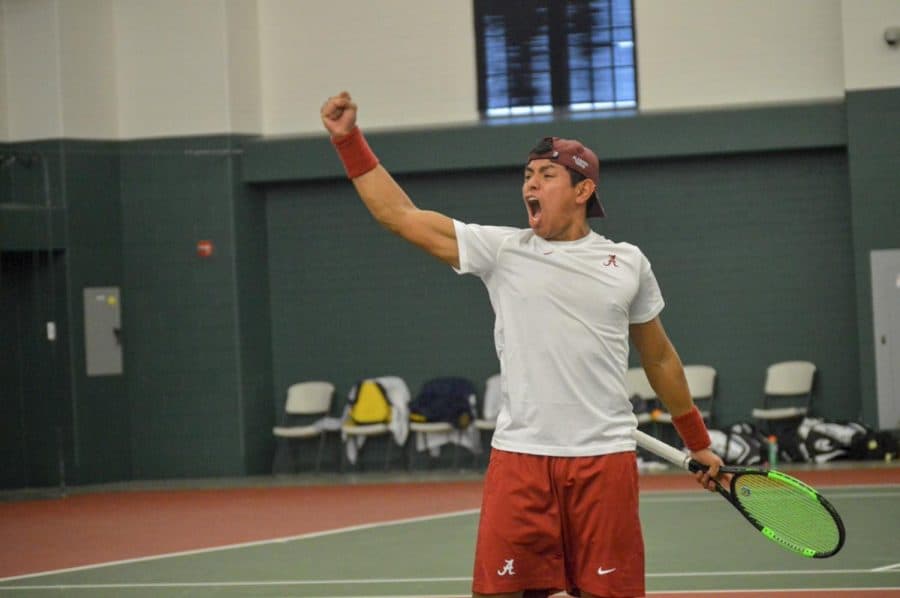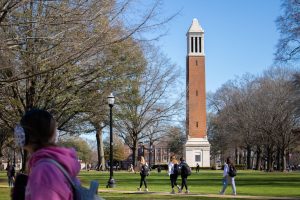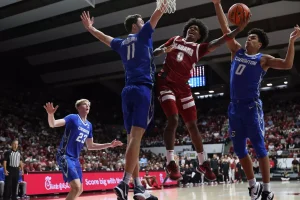Pushing the limits leads to success for Ortiz
January 31, 2019
After a three-hour long match, his legs and arms ached as sweat beaded down his face and neck. Each serve and every return pushed him closer to his physical limit. He heard “Match point, Alabama,” in the distance from the official. His mind stopped registering the pain sometime after the first set to focus on one thing: winning.
The final crack of a racquet and tired grunt from the other side of the court sent his muscle memory into action. He lunged to smack the ball back across the net with a lethal backhand.
When his opponent realized the ball was out of reach, he let loose a rattling, victorious scream of “¡Vamos!” and then jogged to center court to shake hands with the losing player.
“Game, Set, Match, Alabama,” announced the official.
Ortiz’s intense play during matches physically exhausts him; however, his strategic approach drains his mind even more. His dissection of the opponent allowed him to serve and return with purpose, giving him a major edge on his competition.
“Whoever is the first to give up mentally, not physically, is going to lose,” Ortiz said. “It is difficult to plan for opponents when you have never seen them before. The first part of a match is seeing how my opponent responds to certain things [I do.]”
Ortiz, a junior at the University majoring in human performance exercise science, emerged as a natural competitor when he first started college in January of 2017. His relentless play and drive to succeed earned him the Spanish nickname of “El Toro,” or “The Bull,” on the team.
Since then, he has overcome obstacles mentally, emotionally and physically to become a leader for the Crimson Tide.
Ortiz grew up in Chihuahua, Mexico, falling in love with the game at an early age while attending his brother’s tennis lessons. Chihuahua, an area heavily populated with drug cartel-related crimes, left Ortiz telling himself, “I have to get out of here.”
“I think [Chihuahua] is one of the top 10 most dangerous cities in the world,” Ortiz said. “I was fortunate to be young enough to not realize what was going on around me.”
His family had the financial means to support his desire to play tennis, and he was able to move to Valencia, Spain, as well as Naples, Florida, to continue playing while taking classes online.
His strong showing at several high-level tournaments during the summer of 2016 grabbed the attention of multiple Division I programs in the United States. But, Ortiz knew little about the popularity of NCAA tennis.
With the help of his coach in Florida, he grew to understand the opportunity of playing collegiate tennis in the U.S. Alabama coaches George Husack and Robbie Weiss contacted him shortly after his winning performances in 2016, and he visited their school, along with others like the University of Miami.
“You kind of know when a guy visits if they take in the surroundings or not, and [Ortiz] did,” Husack said. “We felt really good about him and really good about his interaction with the team. … He was a thumbs-up across the board.”
The jump from Mexico, to Spain, to Florida, to Tuscaloosa went smoothly for Ortiz from a tennis standpoint. However, the language barrier between his native understanding of Spanish and communicating with American English speakers stunned him at first, despite attending a bilingual school in Mexico.
“The first two weeks of being in Florida, it was like, ‘Did I ever really learn English in school?’” Ortiz said. “The slang was hard at first for about two weeks. I barely ever spoke any English [in Mexico] besides when I was in school.”
Just like he has learned to do as a tennis player, Ortiz adjusted quickly to speaking English in Florida. Now at the University, Ortiz plays on a team of 12 players from nine different countries, all speaking their own native languages while learning new ones along the way.
“All of us are coming from different parts of the world, but all of us have been playing tennis since we were [around] five years old,” said Mazen Osama, a senior on the team from Cairo, Egypt. “In tennis, you don’t really have that team setup except in college, so I think coming here was kind of unique that we had that team setup where we could find someone to motivate us when we have a bad day.”
Ortiz started in the lineup for the Crimson Tide immediately after moving to Tuscaloosa. Husack said Ortiz faced several high-pressure situations and succeeded in them early on, but eventually found himself struggling mentally as he moved closer to the top of the lineup.
Ortiz’s early matches in college affected him only temporarily. He began working with a sports psychologist after his first semester at the University. Ortiz realized how to process each match mentally in order to lessen his competitive tendency to criticize himself.
His move to seek out the sports psychologist’s guidance opened a door for other players on the team. The same doctor has worked with multiple UA tennis athletes since Ortiz, each one of them improving their mental game while growing physically stronger through their weightlifting and conditioning.
“He is a leader on our team,” said Alexey Nesterov, a junior player from Moscow, Russia. “I think he is just a leader by nature. … He works really hard and motivates us to do the best we can every day. He is just a great example for each one of us.”
Ortiz approaches his junior year with plenty of experience to mature from as he looks to face tougher competition this coming season. He has worked to keep playing in tournaments during the NCAA tennis off-season, but deals with the normal struggles of a Division I athlete: balancing classwork with staying in top condition to perform.
“George [Husack] and I were counting my matches earlier, and we think I have played close to 70 matches this year,” Ortiz said. “My shoulder is about to fall off of my body.”
The team’s coaching staff this year looks different than in years past, with the addition of Lalo Ugalde as the volunteer assistant coach. Ugalde, originally from Queretaro, Mexico, is anticipated to be a great coaching fit for Ortiz and the diverse set of players on the team.
Ugalde first met Ortiz when he worked previously with the tennis team at Jacksonville State University in Jacksonville, Alabama. The two have formed a close bond since Ugalde moved to Tuscaloosa, sharing the ability to speak to Spanish.
“From what I have experienced here living in a different country, you sometimes have two personalities,” Ugalde said. “One in English, and a [different] personality when you speak your native language. In Spanish, Edson is even more outspoken to what he is in English. When I speak in Spanish to him, he cannot stop talking. He always goes and goes and goes.”
Ortiz’s tenacious personality appears in all areas of his life. His coaches and teammates know him as someone who is always willing to speak his mind and find the humor in any situation, even when the coaches want to have a serious conversation with the team. Ugalde admitted he can never stay mad at Ortiz for long.
Most days, Ortiz’s daily routine starts around 8 a.m. and ends close to midnight, revolving around practices, treatment time with trainers and conditioning sessions in the weight room.
Ortiz said he is known for wearing his headphones throughout the day, explaining he almost always has them on. His days pass by to a soundtrack of his favorite genres: indie rock and music from the 70s. In a nation full of Division I tennis programs, somehow Ortiz managed to end up at a school where his head coach also shares his love for The Cure.
He explained times when he pushed himself to extreme limits at practice, vomiting and gasping for air, as he transformed his body little by little to be in the best shape of his career. Ortiz reflects on his efforts after those days of exhaustion as he takes a shower and winds down, the day’s sweaty signs of physical exertion washing away.
He said he often thinks to himself, “Wow, I did that today,” as he recounts his efforts at practice and in matches, but El Toro is never satisfied.










